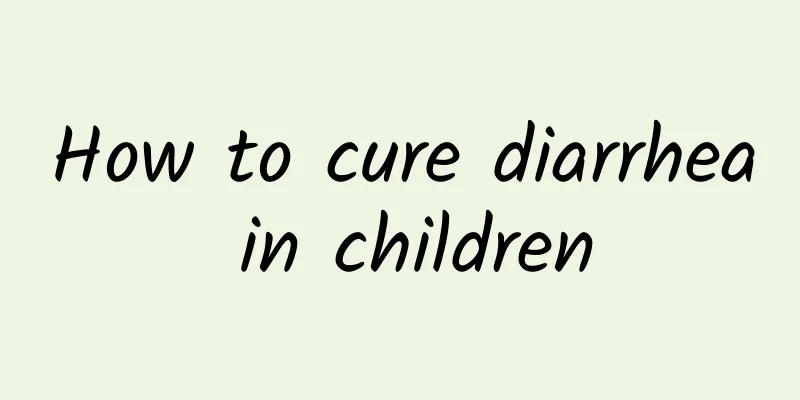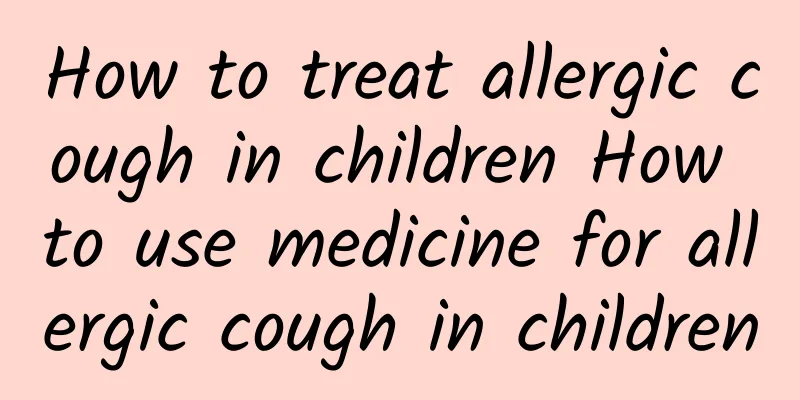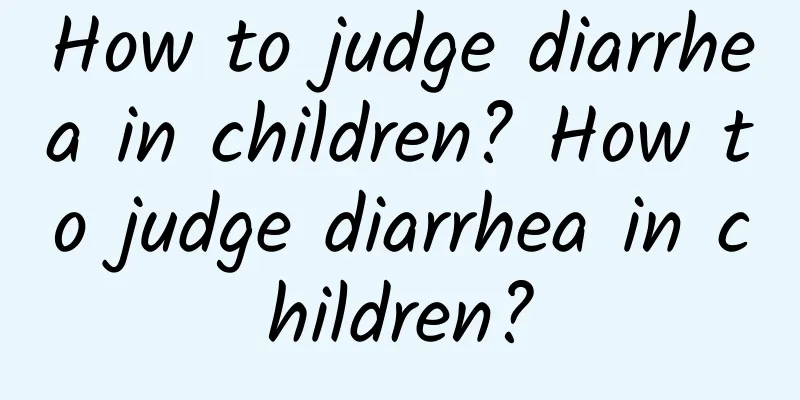How to cure diarrhea in children

|
Pediatric diarrhea is the second most common disease after respiratory tract infection. The most common cause of diarrhea in children is infection. In addition, children's gastrointestinal function is not perfect, and allergies to breast milk or certain foods can also cause diarrhea. How can we prevent and care for pediatric diarrhea? 1. Breastfeeding can prevent diarrhea Breastfeeding should be especially adopted in the first few months after birth. Breast milk is the most suitable for infants' nutritional needs and digestive ability. Breast milk contains a variety of digestive enzymes and antibodies needed by children. Various nutrients are very suitable for children's digestion and absorption. It can neutralize Escherichia coli enterotoxins and prevent infection with Escherichia coli. It is much better than cow's milk and breast milk substitutes. Except for those suffering from tuberculosis, heart and kidney and other chronic diseases, breastfeeding should be promoted. Attention should be paid to the correct feeding method, regular breastfeeding, and avoid weaning in summer and when the child is sick. Breastfeeding can prevent diarrhea in children. 2. Use a bowl and spoon instead of a bottle Bottles, especially rubber nipples, are easily contaminated and difficult to clean and disinfect. They are easily contaminated and can cause diarrhea in children. Use a bowl or spoon instead, which has less chance of contamination than a bottle. 3. Timely fluid replenishment to prevent dehydration Most cases of diarrhea in children start very quickly. Frequent diarrhea can cause rapid loss of water and nutrients in the body, resulting in acute dehydration. At home, parents can add 20 grams of sugar (two level spoons) and 1.75 grams of salt (half a beer bottle cap) to 500 ml of boiled water (or rice soup) to make oral rehydration solution. Since children with diarrhea have a higher demand for fluids than usual, they should be encouraged to drink more at the beginning. Children under 2 years old can supplement with 50 to 100 ml of oral solution after each diarrhea, and the daily intake should not be less than 500 ml; those over 2 years old should drink as much as possible, with a daily intake of not less than 1000 ml or even more to prevent dehydration. If the child has symptoms of dehydration, he should go to the hospital immediately and continue to replenish oral fluids on the way. 4. Add complementary food on time Children grow and develop rapidly. Whether they are breastfed or bottle-fed, complementary foods should be added on time to meet their nutritional needs. When adding complementary foods, the variety should not be too many, and the changes should not be too frequent. Only after the baby gradually adapts to the new food can other foods be gradually added. Specifically, when adding complementary foods, pay attention to the baby's digestive ability. Only one type can be added at a time, from a small amount to a large amount, and gradually increase. Generally, vitamin C and D are added half a month after birth, vegetable soup, milk cake or rice paste are added at 2 to 3 months, and egg yolks, minced meat and chopped vegetables are added at 4 to 6 months. 5. Pay attention to the quality of your diet When mixed feeding and artificial feeding are adopted due to insufficient breast milk or lack of breast milk, attention should be paid to diet adjustment. It is not advisable to feed rice paste or porridge and other foods too much or too early to avoid carbohydrate indigestion and affect the growth and development of children. If infants from birth to 3 months do not have enough breast milk, they can eat milk or soy milk to supplement. Whether using cow's milk or milk substitute, it needs to be properly diluted to facilitate digestion and absorption. When the appetite is poor, it is not advisable to force feeding. 6. Enhance physical fitness Usually, we should strengthen outdoor activities, improve the ability to adapt to the natural environment, pay attention to physical exercise of children, strengthen their physical fitness, improve the body's resistance, and avoid infection with various diseases. 7. Avoid adverse stimulation Children should avoid excessive fatigue, fright or excessive mental stress in their daily lives, as these may cause diarrhea in children. 8. Do not abuse antibiotics In fact, more than half of pediatric diarrhea is caused by viruses or improper diet. For diarrhea caused by these reasons, antibiotics are not only ineffective, but will kill the normal flora in the intestines, causing flora disorders and aggravating diarrhea. |
<<: How to cure diarrhea in children
>>: Is it difficult to cure diarrhea in children?
Recommend
How to improve baby's indigestion? What is the best food for baby's indigestion?
Indigestion in babies is a common problem. Eating...
Does hand, foot and mouth pneumonia have sequelae?
Pneumonia, a complication of hand, foot and mouth...
How to treat pseudojaundice? Two methods of treating pseudojaundice are introduced.
Many friends have asked doctors about pseudojaund...
What are the symptoms of ADHD in children?
ADHD, also known as attention deficit hyperactivi...
Why do I feel so absent-minded all the time?
Being absent-minded may be the result of multiple...
Will newborns with physiological jaundice be sleepy? You should know the specific symptoms of physiological jaundice in newborns
Neonatal physiological jaundice is a common sympt...
Can babies eat eggs when they have a cough? What dietary habits should babies pay attention to when they have a cough?
When children cough, if they are not allergic, th...
What tests should be done for infants with Hirschsprung's disease?
The diagnosis of Hirschsprung's disease in in...
Diagnostic criteria for early childhood diarrhea
Parents must closely monitor their baby's bow...
How to distinguish pneumonia and tuberculosis in children
How to diagnose pneumonia and tuberculosis in chi...
What foods can supplement iron? What are the symptoms of iron deficiency?
Cherry is a good iron supplement food. It is high...
Does neonatal jaundice require treatment?
Does neonatal jaundice require treatment? Whether...
Is massage effective in relieving baby's indigestion? What are the hazards of indigestion?
Indigestion in children is mainly manifested by p...
How to reduce high jaundice in newborns
Neonatal jaundice can be reduced through general ...
Blood test for polio
Polio is a disease that troubles many parents. Fi...









